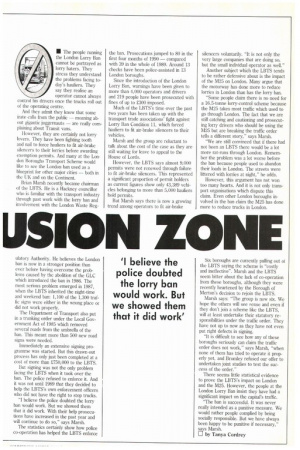• The people running the London Lorry Ban cannot be
Page 39

If you've noticed an error in this article please click here to report it so we can fix it.
portrayed as lorry haters. They stress they understand the problems facing today's hauliers. They say they realise an operator cannot always control his drivers once the trucks roll out of the operating centre.
And they admit they know that some irate calls from the public — moaning about gigantic juggernauts — are really complaining about Transit vans.
However, they are certainly not lorry lovers. They have been fighting tooth and nail to force hauliers to fit air-brake silencers to their lorries before awarding exemption permits. And many at the London Boroughs Transport Scheme would like to see the London ban used as a blueprint for other major cities — both in the UK and on the Continent,
Brian Marsh recently became chairman of the LBTS. He is a Hackney councillor Who is familiar with the transport industry through past work with the lorry ban and involvement with the London Waste Reg
the ban. Prosecutions jumped to 80 in the first four months of 1990 — compared with 39 in the whole of 1989. Around 13 checks have been police-assisted in 13 London boroughs.
Since the introduction of the London Lorry Ban, warnings have been given to more than 4,000 operators and drivers and 219 people have been prosecuted with fines of up to 2300 imposed.
Much of the LBTS's time over the past two years has been taken up with the transport trade associations' fight against Lorry Ban Condition 11, which forced hauliers to fit air-brake silencers to their vehicles.
Marsh and the group are reluctant to talk about the cost of the case as they are still waiting for leave to appeal to the House of Lords.
However, the LBTS says almost 9,000 permits were not renewed through failure to fit air-brake silencers. This represented a significant proportion of permit holders as current figures show only 43,389 vehicles belonging to more than 5,000 hauliers hold permits.
But Marsh says there is now a growing trend among operators to fit air-brake silencers voluntarily. "It is not only the very large companies that are doing so, but the small individual operator as well."
Another subject which the LBTS tends to be rather defensive about is the impact of the M25 on London. Many argue that the motorway has done more to reduce lorries in London than has the lorry ban.
"Some people claim there is no need for a 16.5-tonne lorry-control scheme because the M25 takes most traffic which used to go through London. The fact that we are still catching and cautioning and prosecuting lorry drivers who should be using the M25 but are breaking the traffic order tells a different story," says Marsh.
"We are still convinced that if there had not been an LBTS there would be a lot more rat-runs through London. Remember the problem was a lot worse before the ban because people used to abandon their loads in London. The streets were littered with lorries at night," he adds.
However, this argument has not won too many hearts. And it is not only transport organisations which dispute this claim. Even other London boroughs involved in the ban claim the M25 has done more to reduce trucks in London.
























































































